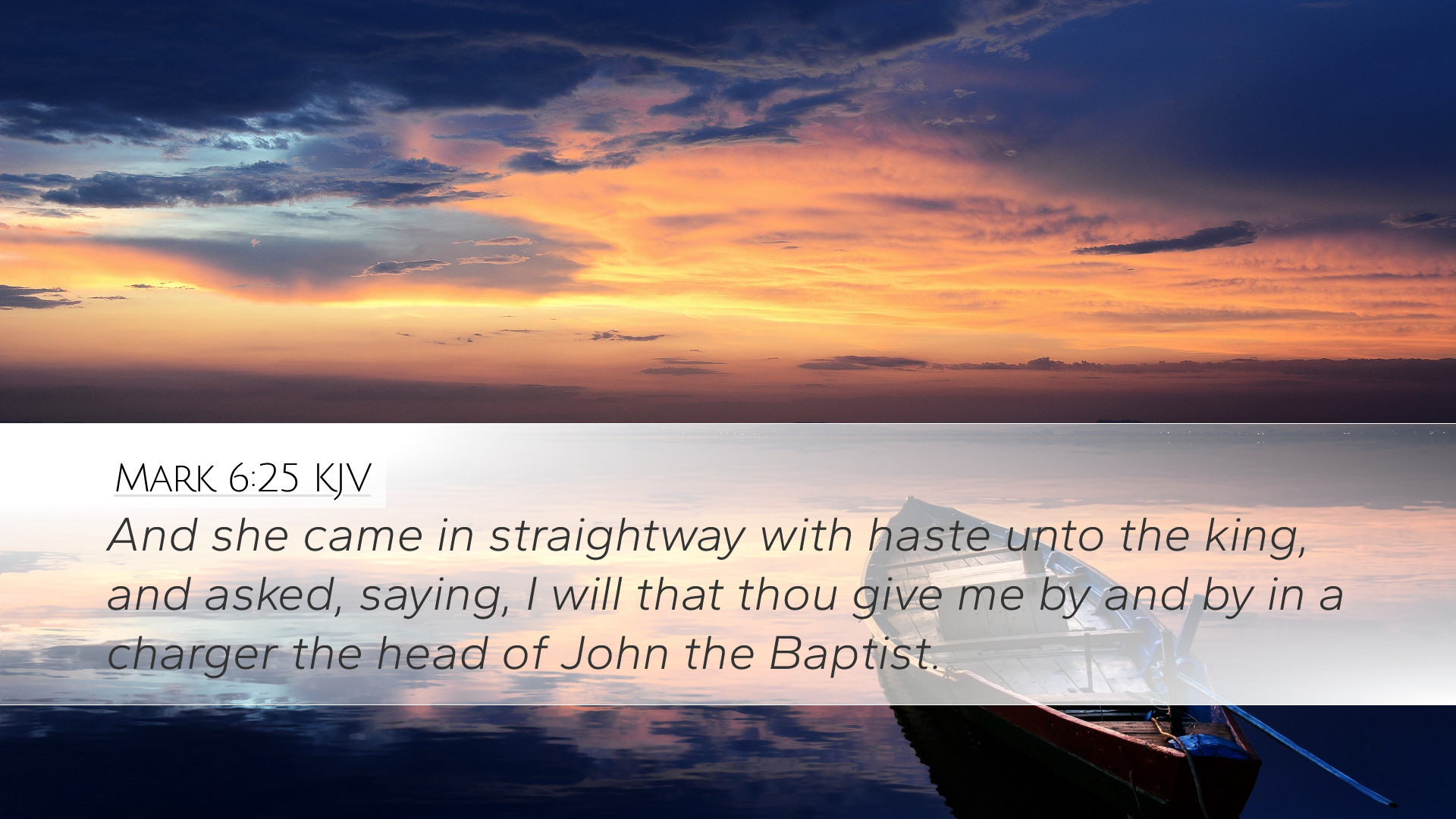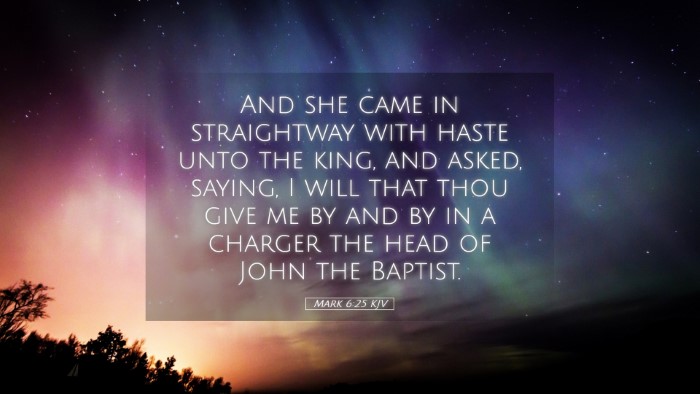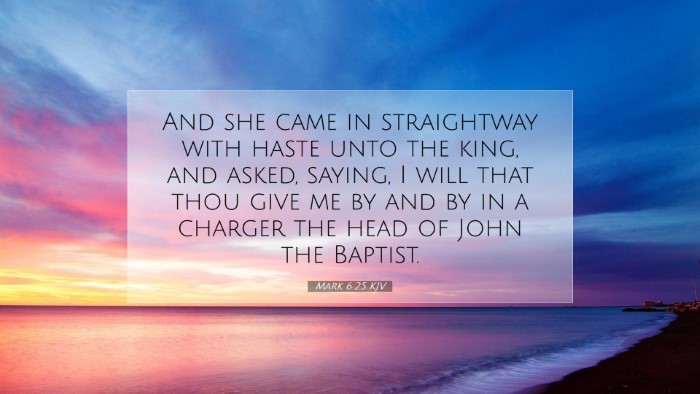Commentary on Mark 6:25
Mark 6:25 states:
"And she came in straightway with haste unto the king, and asked, saying, Give me by and by the head of John the Baptist on a charger."
This verse reflects a significant moment in the narrative of John the Baptist's fate, demonstrating the gravity of political and personal motivations intertwined in this biblical account. This commentary combines insights from various public domain sources to provide a deeper understanding of its implications and teachings.
Contextual Background
The events leading up to Mark 6:25 take place during the tumultuous reign of Herod Antipas, during which John the Baptist had become a vocal critic of Herod's illicit marriage to Herodias, the wife of his brother Philip. This act of standing for righteousness ultimately led to John being imprisoned.
Herod’s Perplexity
Matthew Henry notes that Herod had an odd respect for John, recognizing him as a righteous and holy man (Mark 6:20). Herod's conflicted feelings symbolize the tension between moral conviction and political expediency, which resonates with the struggles individuals often face when confronted with truth in a corrupt environment.
The Role of Herodias
Herodias, who harbored deep resentment towards John for his condemnation of her marriage, plays a pivotal role in this account. Albert Barnes elucidates how her vengeance is not merely personal; it represents the broader conflict between righteousness and unrighteousness. Her boldness in demanding John's beheading exemplifies the extent to which evil will go to silence truth.
The Request for John’s Head
The phrase "Give me by and by the head of John the Baptist on a charger" underscores the hastiness and impulsiveness of Herodias's request. Adam Clarke emphasizes the dramatic nature of this demand, highlighting that the head of John, a prophet, held deep significance and symbolized the triumph of evil over good.
The Nature of Requests to Power
Herod, in a moment of foolishness, had promised his daughter Salome whatever she wished (Mark 6:23). This reflects a capricious and reckless use of power, a theme prevalent in the biblical narrative. Clarke remarks that this situation serves as a cautionary tale regarding the consequences of making promises without proper consideration for moral and ethical implications.
The Influence of the Dance
Salome’s dance, which pleased Herod, serves as symbolic of how entertainment can distract and manipulate those in power. This moment illustrates the dangers of being swayed by superficial allurements, leading to grave outcomes. Matthew Henry points out that such actions often lead leaders to make ill-fated decisions.
Theological Implications
The beheading of John the Baptist is a poignant illustration of the cost of discipleship and the often brutal reality of standing against the tide of popular opinion. This narrative invites deep theological reflection on the nature of truth and martyrdom. The early church viewed John's death not as a tragic loss but as a testament to the victory of faith.
Martyrdom and Witness
The death of John is a precursor to the fate of Jesus, highlighting the theme of unjust suffering. John represents the call to witness truth in a world resistant to it. Albert Barnes cites this as a critical moment in the ministry of Jesus, establishing a foreshadowing of His own impending suffering and calling believers to remain steadfast in their witness.
The Sovereignty of God
Henry emphasizes the sovereignty of God amidst human evil. Despite Herodias's triumph in silencing John, God's purposes are not thwarted. The eventual resurrection of John in the identity of Jesus establishes a continuity of truth that even death cannot erase. Hence, believers are encouraged to recognize that God works through human events, no matter how dire they may seem.
Lessons for Today
This passage serves as a powerful reminder for pastors, students, theologians, and scholars about the nature of righteousness in the face of persecution. The fervent requests of Herodias for vengeance should remind us of the ever-present struggle between good and evil.
- Standing Firm in Faith: Believers are called to stand firm in their faith, even when it is unpopular or could lead to personal loss.
- The Dangers of Moral Compromise: The actions of Herod and Herodias reveal the dangerous consequences when individuals, especially those in power, prioritize personal interests over moral integrity.
- The Power of Influence: Salome's dance underscores the profound impact of influence—whether for good or ill—reminding contemporary believers to discern the motivations behind entertainment and societal pressures.
- God's Sovereignty: Finally, Christians are encouraged to trust in God’s sovereignty. No matter the circumstances, His purposes will prevail, and believers have the assurance of ultimate justice and truth.
Conclusion
Mark 6:25 encapsulates a significant moment of drama, power, and faith that resonates through the ages. As we reflect on this narrative, let us be reminded of our call to witness truth boldly, act with moral integrity, and trust in the sovereignty of God amidst trials. This story, while tragic, offers profound insights into God's working in a world often hostile to His message.


